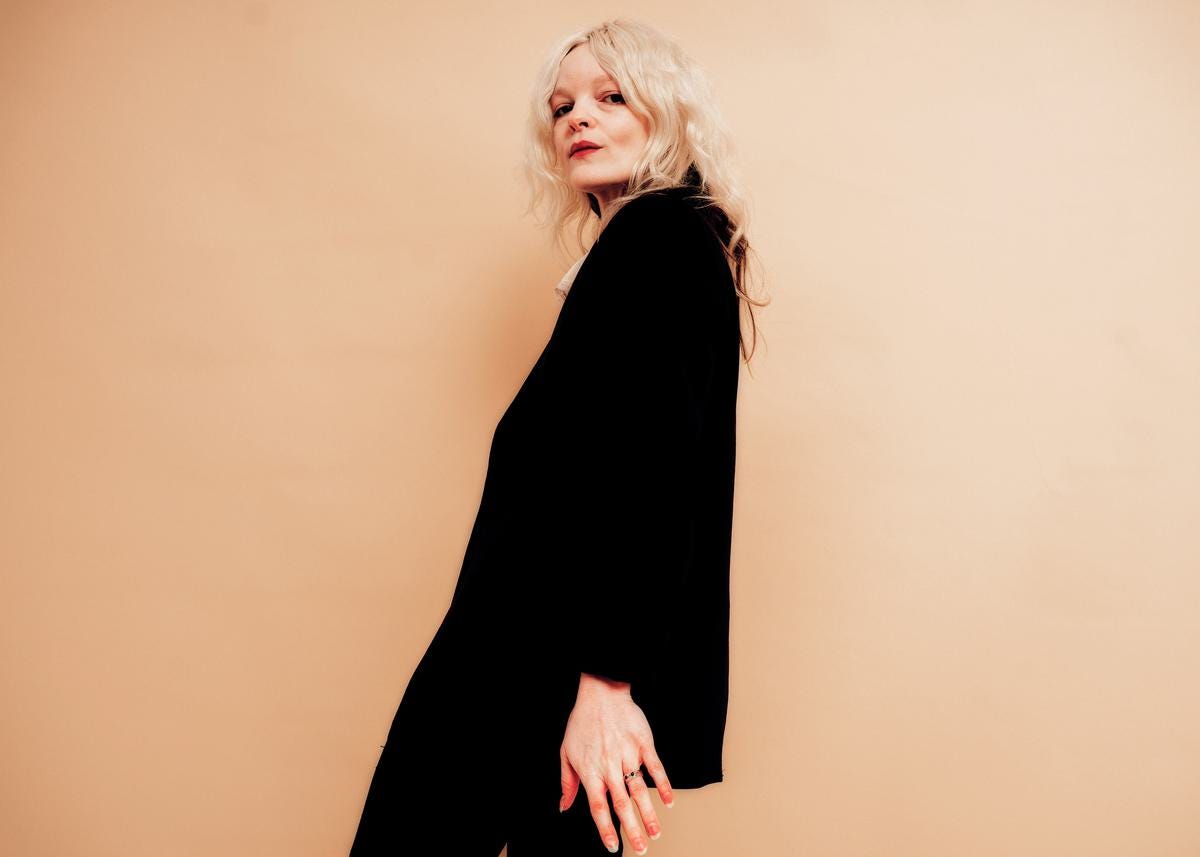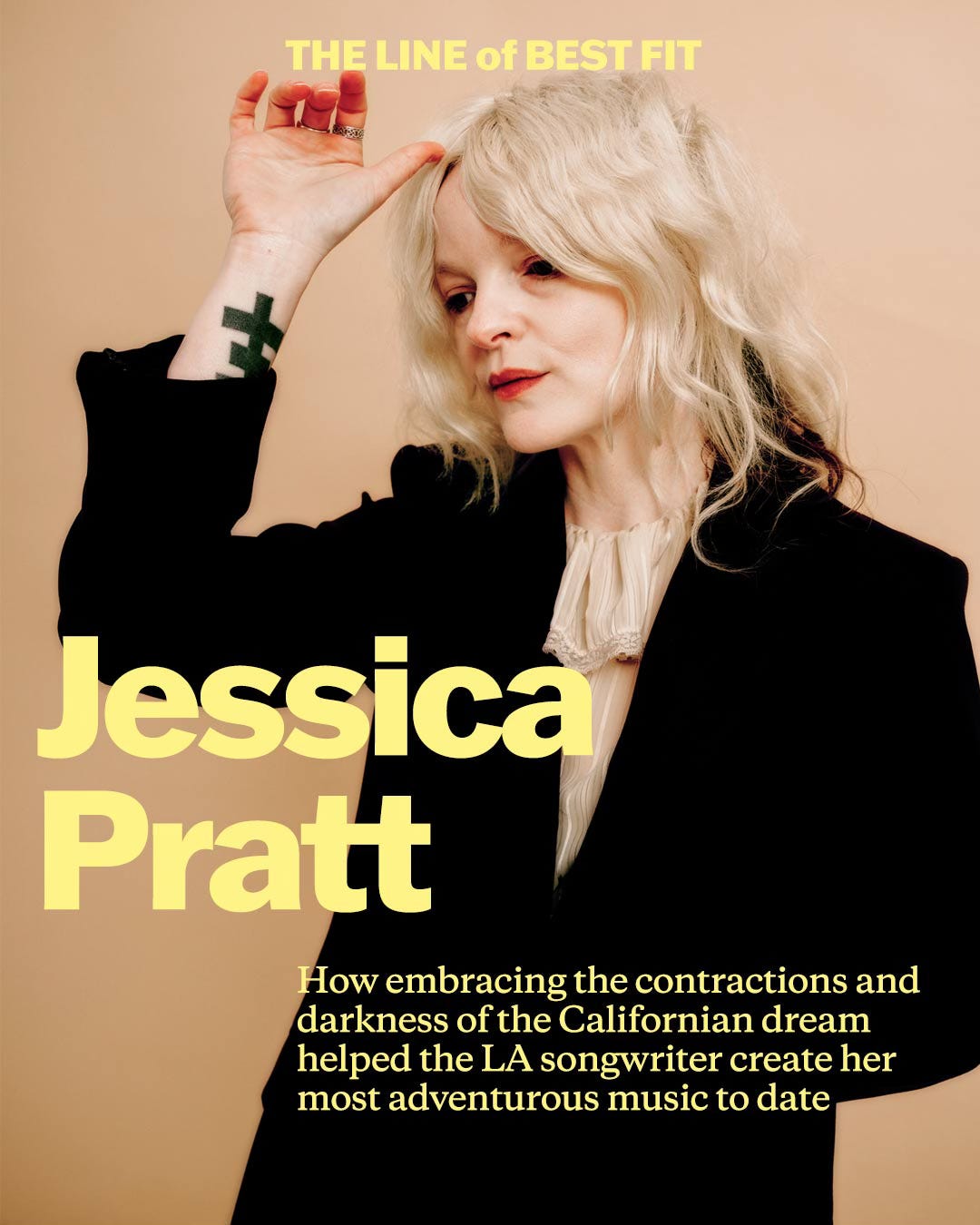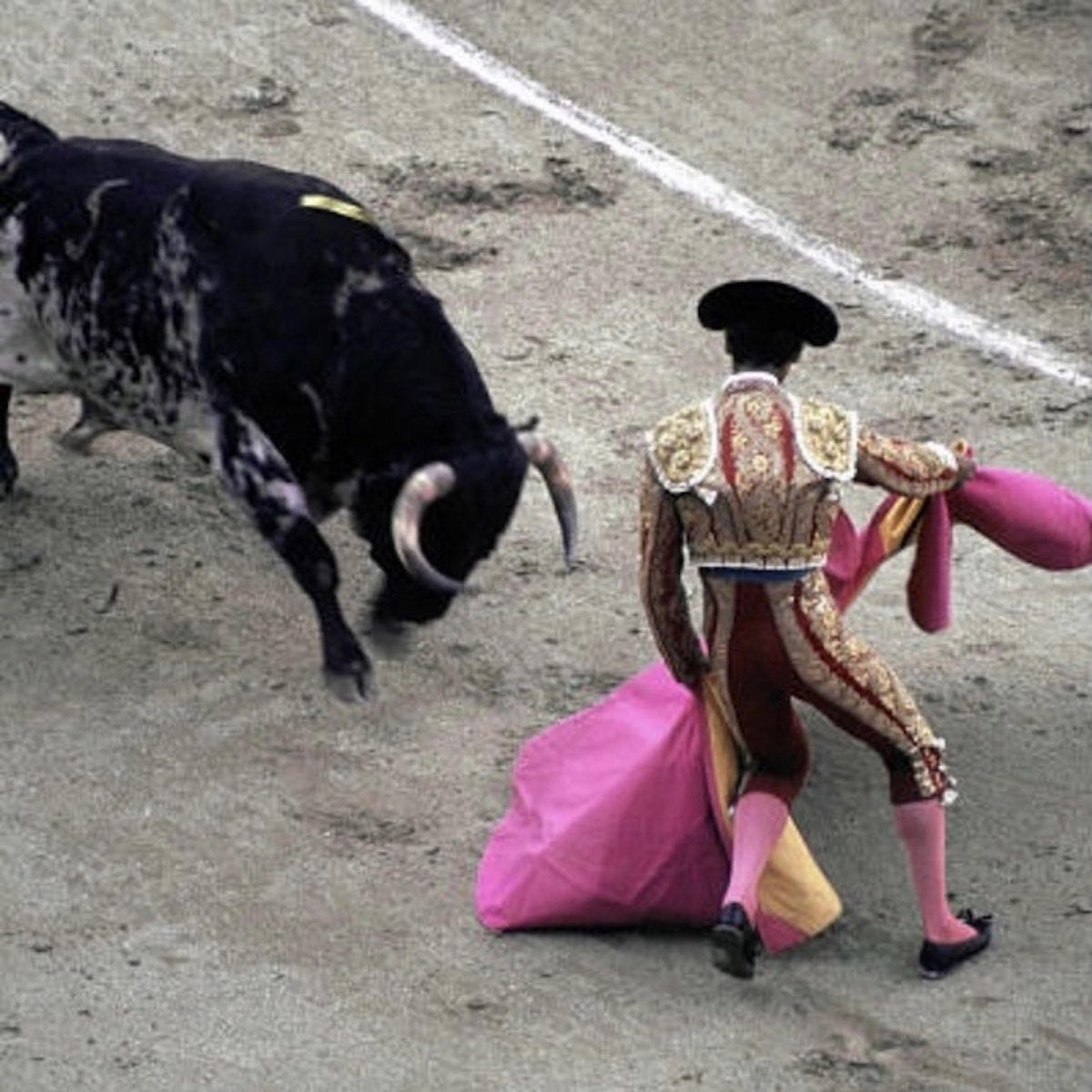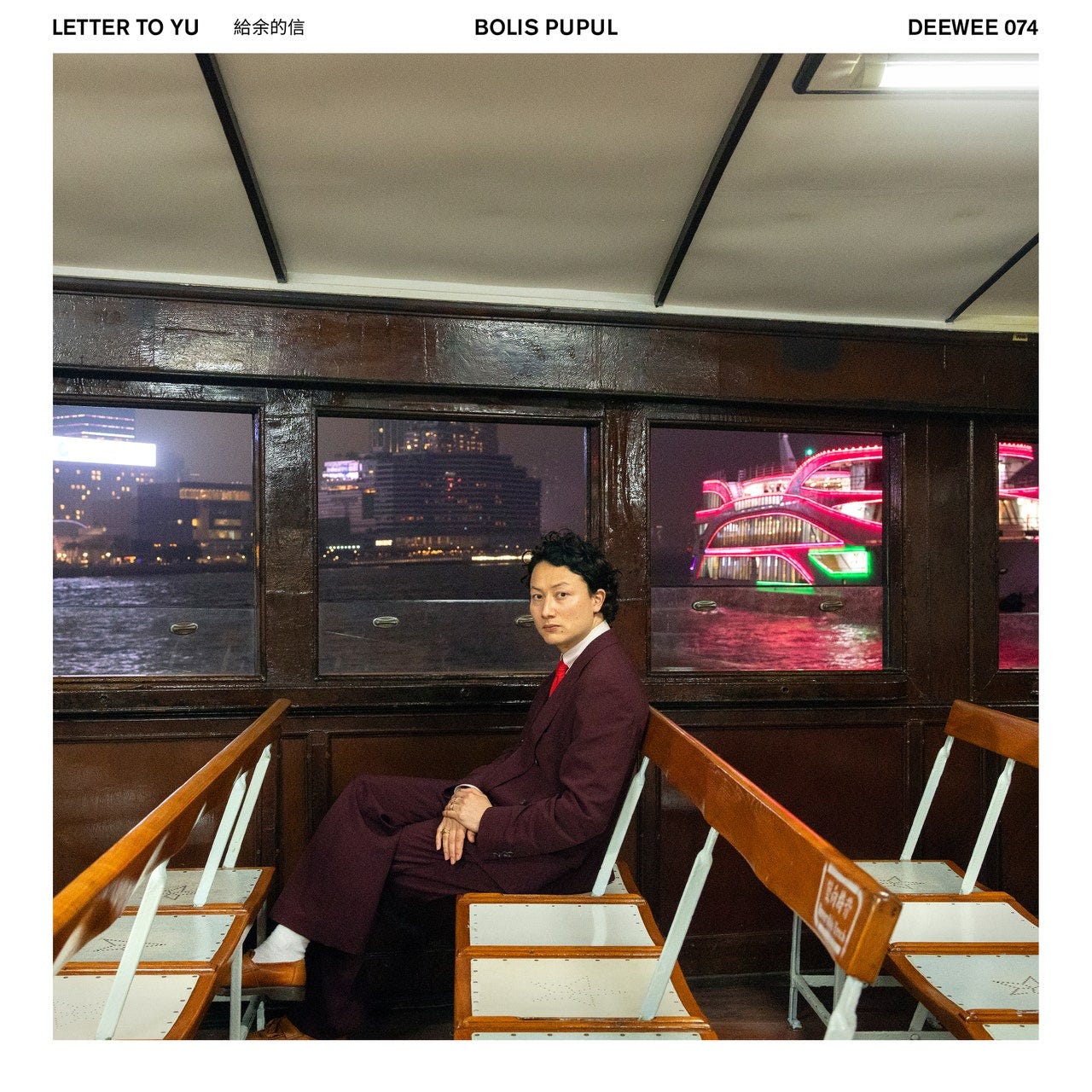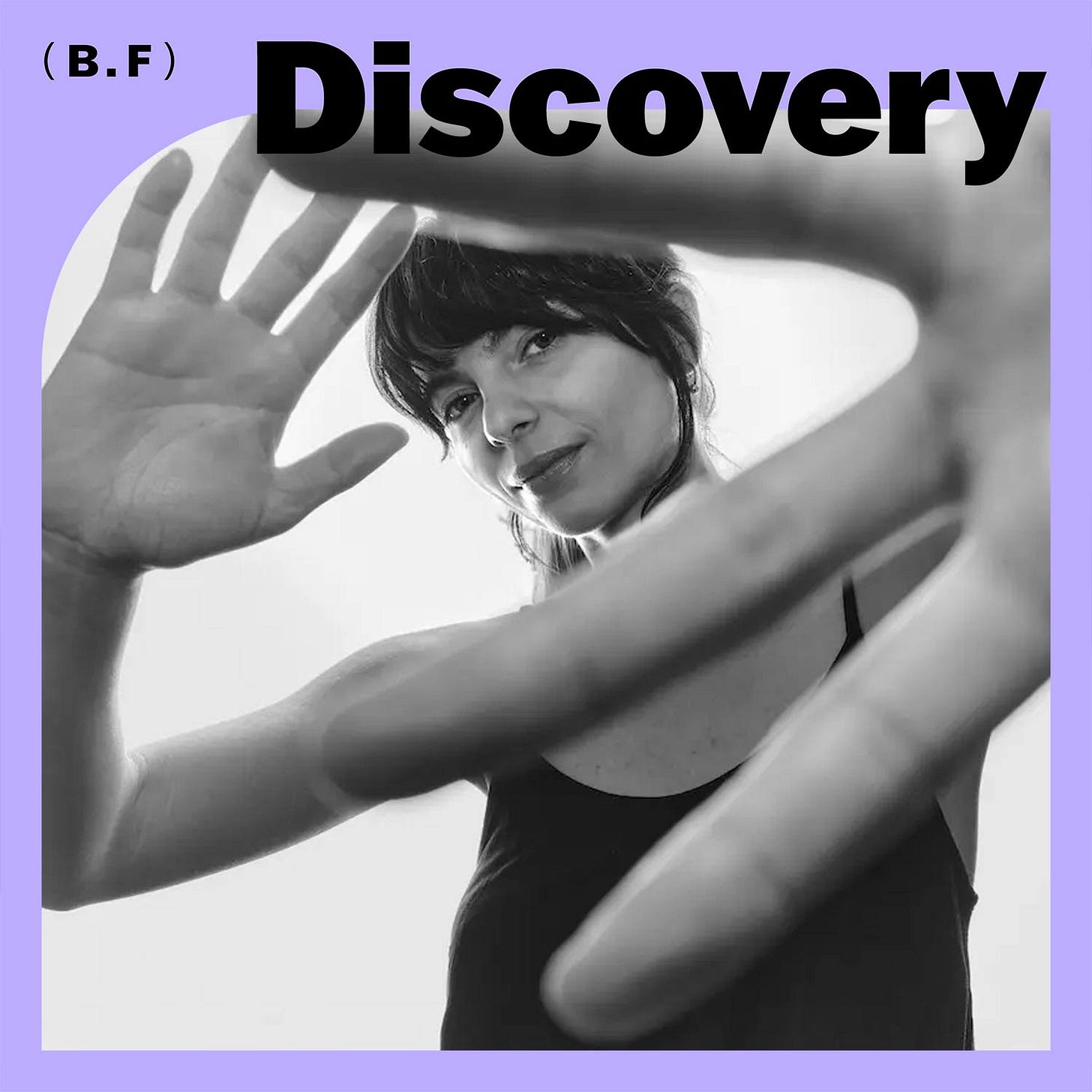For Jessica Pratt, serving her intuition is what keeps her music so distinctive even as it moves into a more assertive space. She dives into her elliptical new world with Best Fit for this week’s digital cover.
“My one weird idea about art, and the world in general, is that it always comes back to ambiguity,” says Jessica Pratt. “It seems to be at the heart of a lot of what I say about why I do things, how I do things. What I like about music is the part of it that you can't quite explain or see or know – that mysterious element.”
On her latest album — Here in the Pitch, out today — Pratt still can’t quite pin down the place she’s channelling from. “I've always enjoyed lyrics and songwriting that feel a little more ambiguous or like a semi-fictionalised version of a story,” she notes, shrugging a bit. “And I don't know where that comes from.”
Though this latest set of lyrics admittedly sounds more assertive and structured than some of her previous work, the stories on each track nonetheless almost feel more disembodied or fractured than anything Pratt’s done before. You could argue these songs almost completely eschew straightforward tales of love and loss, instead giving listeners the feeling that they’ve been dropped in the middle of a conversation – the musical ghost expressing itself in a way that feels more malevolent than before.
By her own best guess, the place Pratt writes from that allows her to channel these voices is “a combination of my own personal perspective, what you would call autobiographical songwriting. […] That's a certain percentage of it, probably a smaller one,” she adds. “[But] I would say the larger half of the ratio is sort of using characters as a vessel for your emotions, and maybe that sort of refreshes those emotions or magnifies them in some way.”
“It’s like an omniscient voice,” Pratt notes of these varied characters, who she explores fluidly on the album, often singing from multiple viewpoints on each track. “That's how it always seems to me. Sometimes [on a song], there are even a few different perspectives where it's like there's an all-seeing eye. Then there are certain phrases or comments coming from individual characters within the song. It's not very clear what that is, but I don't think the effect is confusing. That can definitely be the case with writing like that: you're too distracted or there's nothing to hold onto. But, for whatever reason, it’s always my inclination to write this way and it seems to feel intuitively correct.”
The Lemon Twigs are doubling down on their sound
The Lemon Twigs grew up on the sounds of the ‘60s and ‘70s, and their admiration for these eras has not only shaped new record A Dream Is All We Know, but has been propelling them forward since the beginning. “It was the first music we ever loved, and it's what we always go back to,” says Brian D’Addario. “We grew up on it the same way that people who actually lived through those years as children and teens grew up on it – We never were exposed to music of our time, basically because of our parents, so it just always feels natural for us to write with a sixties or seventies pop arrangement in mind.”
The brothers D’Addario have merged modern ideas with techniques of the past to create something entirely new on the new album, which was recorded by the brothers in analog format in their Brooklyn studio, further cementing that classic 1968 sound. While their other projects have usually featured some analog and digital recordings, this project was done entirely analog. “I think it gives it a more glued-together, compressed sound doing it that way,” Michael D’Addario says. “It's a little bit more rugged. There was a lot more utilisation of bust compression and over-compression as an effect too, as opposed to the last record, which was very much a natural, clean sound. This is much more manipulated.”
According to Michael, opting for those more raw techniques really helps to complete the picture. “We use analog as a vehicle because we think that it was kind of a big part of [the sound of 1968] and people maybe miss that,” he explains. “It feels timeless.”
Lemoncello go all-in on their debut record
For Lemoncello’s Laura Quirke and Claire Kinsella, recording their self-titled debut album – out today – was an“all or nothing” endeavour. Working with acclaimed producer Julie McLarnon, the Dublin-based duo made the choice early on to record and mix the album to two-inch tape at Analogue Catalogue Recording Studios in Ireland. McLarnon’s meticulous analogue discipline has been documented through her work with The Vaselines, Brigid Mae Power, Lankum and Junior Brother, and as Quirke and Kinsella worked on their first full-length LP, they knew they wanted to bring this mindset to their project, too.
“Julie believes wholeheartedly in the philosophy of the process of analogue recording”, Quirke explains. “There were no screens in the studio at all. We learned so much about listening, because you couldn't look at anything. You're not seeing any of the music in front of you, in terms of frequencies. In terms of sound and production, it was just such an education doing it this way. She has a kind of punk approach to things. I liked how she made us sound new to ourselves when we listened back. It never sounded like a dead room; there was real life in the recordings she made of us.” Quirke’s sentiments about McLarnon serendipitously match those she expresses on album track “Old Friend” - “Old friend / Let’s pretend that we’re strangers again.”
Kinsella found the process equally as fascinating, as it forced her to be more assertive when choosing which takes to discard and record over. “You have to really face yourself and really be able to stand by why this is the take,” she explains. Having only ever recorded digitally before, the pair observed McLarnon’s mixing skills in real-time on her 70’s tape machine, which has no automation. Quirke described McLarnon’s process as “beautiful to watch”, like she was “conducting an orchestra” as she mixed the EQ and added effects simultaneously for each song, a process which was repeated, but only a select amount of times.
“We had to pick things that mattered to the feeling of the thing, rather than whether it was technically right”, Quirke shares. She believes this is one of her strengths as a musician, and committing to recording in this manual way enhanced this inherent quality in Lemoncello’s music. Kinsella also agrees that tape captured something that digital methods could not: “You just really feel the performance. I think that there is such a magic to how Julie records.”
Would Lemoncello record their next album in the same way? Probably not. But that leans into their personal and musical philosophy of capturing a moment, giving everything to it whilst they’re in it, and instinctively knowing when to move on to something new.
Three things to get excited about this week
The show: This week, Massive Attack announced their first UK show in five years, an all-day event at Clifton Downs scheduled for August 25. Titled “Act 1.5,” the showcase serves as a capstone on the band’s 25 years of climate activism and will be the largest carbon-neutral event of its kind. Fellow performers include Killer Mike and Lankum.
The artist: After two quiet years, Oakland lofi duo dog eyes burst back on the scene last week with “fair”. Though not abandoning the twee, folksy sensibilities of their first project, “fair” is an addictive acid-trip of a single, employing electronic vocal processing techniques and guitar flourishes. It’s a promising early release from a group that could be the next indie folk one to watch.
The debut: In case you missed it, last week, Jagjaguwar newcomer Chanel Beads dropped his debut album, Your Day Will Come. Ambient and abstract, Best Fit writer Kyle Kohner proclaimed that the record “entrenches listeners in a place that can only be captured as eerie.” And yet, it’s a good kind of eerie, the sort of haunting affect that leaves you just as comforted as it does disturbed, cementing Chanel Beads at one of the most exciting frontiers of experimental pop.
Something Old, Something New
Every week, one of Best Fit's writers or editors share their recommendations of two records they love - one from the past, one from the present. This week, Substack editor Laura David on Romeo + Juliet’s Raging Bull (2022), and Bolis Pupul’s Letter To Yu (2024).
Intended to be his final project, the end to his era of “trying the music thing,” it was 2022’s Raging Bull that breathed life back into NJ-native Romeo + Juliet’s creative career. Though the project bears marks of Frank Ocean (channel ORANGE devotees should start with “Parade,” reminiscent of fan favourite “Pyramids”), of Ryan Beatty, and of Tyler the Creator, the work as a whole is far more than the sum of its parts. Offering a fresh take on R&B/electronic fusion, Raging Bull feels like an instant clastic even on the first listen. Leaving no stone unturned, the album is striking expansive and impressive. Romeo + Juliet’s vocal tone — high pitched and piercing, though always satisfyingly smooth — and instrumental prowess stand out most. Tracks like “Exordium” and “500 Days of Summer” wash listeners in a 40-minute dreamscape-esque bath of harmonies, arpeggiating synths, soulful guitars, and even the occasional Ocean signature helium-voice autotune cameo. Every single note serves a purpose and feels as though it has been meticulously poured over to create an emotional, immersive, and truly perfect sonic experience. Overlayed on these arrangements are poetic laments on love, yearning, and loss: “Why do you think that Romeo / Killed himself in cold blood / He did it for the love,” Romeo + Juliet laments on “King David.” This record, truly, is cinematic in scope, living up to the namesake of its maker.
Inspired by the tragic death of his mother in a car accident in 2008, Letter To Yu, the debut solo album by Belgian musician Bolis Pupul, pays a sensitive pledge to house and techno while honouring his Chinese heritage and dealing with the universal truths of memory, loss, and family.
“The first day I arrived in town I visited the street where she was born and wrote her a letter. This letter became the core of my record,” Pupul said on the record’s thematic genesis, a trip to Hong Kong in the wake of his mother’s death. Upon sharing the letter with mentors Stephen and David Dewaele (who also play as 2manydjs and form the foundation of the band Soulwax), the duo pushed Bolis to elaborate on the letter's content and create a whole album about his experiences in Hong Kong. Pupul's journey through mourning radiates in Letter to Yu, serving as both a statement of acceptance in the face of tragedy and a pledge of eternal optimism. Pupul uses a lush palette of vintage synth pop and leftfield electronic music to endow his tracks with personality and character, revealing hard truths about his relationship with his background while finding welcome relief on the dance floor.
It feels a little churlish to criticise something so heartfelt - but the thing is, the rest of the record is so perfectly poised and put together, so rich and complex in its melancholy and dislocation, so exquisite in its incorporation of Chinese tonality and timbre into its electro-pop frameworks, that the exposition feels unnecessary. Pupul – who made the incredible Topical Dancer with Charlotte Adigéry in 2022 – doesn't always mix harsh angles with soothing electronica: sometimes stuff simply has to go hard, like on the club-ready "Kowloon" or "Doctor Says," with their exhilaratingly danceable boom-boomism. On the contrary, he sprinkles occasional moments of relaxation throughout the album, such as the tranquil concluding track "Cosmic Rendez-Vous."
Perhaps the most poignant standout, though, is “Ma Tau Wait Road,” which features bells ringing over a midtempo groove while Pupul's sister, Salah, sings about making a new connection with their simply by wandering Hong Kong's streets. From inception to execution, Letter To Yu is a poignant family affair fused with experimental electronica.
Listen to the week in new music by following our Discovery playlist
Dropping at midnight every Thursday, follow our playlist for a taste of the best new music from the most exciting breaking artists – 20 new tracks, top-loaded from the last five days in music and on repeat among out editors and writers right now.
Leading the selection this week are new tracks from Liza Lo, KNEECAP, Sunday (1994), No Windows and coverstar Gracie Gray.



